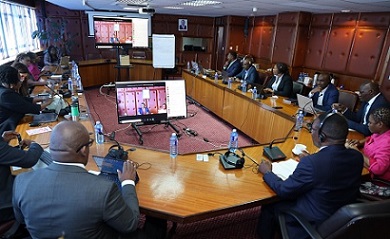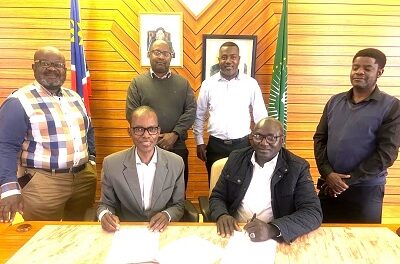Victor Angula |
Despite its achievements, the Windhoek Declaration on the Promotion of an Independent and Pluralistic African Press failed to record gains in Namibia on some of its basic promises.
The famous Declaration was drafted and adopted by African journalists and media practitioners and government representatives who gathered under the auspices of UNESCO for a conference held in Windhoek, Namibia, from 29 April to 3 May 1991.
One of the notable failures is on the plurality of the Namibian media. Until today, 29 years after the declaration, the Namibian private media is still 90% owned by white Namibians.
The Declaration’s Articles 15 and 16 said:
“15. Cooperation between publishers within Africa, and between publishers of the North and South (for example through the principle of twinning), should be encouraged and supported.
“l6. As a matter of urgency, the United Nations and UNESCO, and particularly the International Programme for the Development of Communication (IPDC), should initiate detailed research, in cooperation with governmental (especially UNDP) and nongovernmental donor agencies, relevant nongovernmental organizations and professional associations, into the following specific areas:
> identification of economic barriers to the establishment of news media outlets, including restrictive import duties, tariffs and quotas for such things as newsprint, printing equipment, and typesetting and word processing machinery, and taxes on the sale of newspapers, as a prelude to their removal;
> training of journalists and managers and the availability of professional training institutions and courses;
> legal barriers to the recognition and effective operation of trade unions or associations of journalists, editors and publishers;
> a register of available funding from development and other agencies, the conditions attaching to the release of such funds, and the methods of applying for them;
> the state of press freedom, country by country, in Africa.”
When asked to explain the failures of the Declaration, UNESCO’s Country Representative Mr Djaffar Moussa-Elkadhum said:
“A declaration is … you have a large community, diverse community and you try to advocate and you just set up a goal, a global goal and you ask each country according to its context and its commitment to say can we reach there? Some will move at a 100%, some at 90%, but globally the world would have moved somehow.
“The Windhoek Declaration is not a UNESCO one, because it is a declaration that was made by African journalists through a UNESCO conference, then it was also adopted as a guiding principle and again you see the word ‘guiding’ is there, to guide all countries to reach there. And it has moved somehow, it has pushed also the world to change since 1991.
“The major achievement of Windhoek Declaration is that after Windhoek many regions sat together, they followed the model of African journalists, and they gathered in various regions to actually have the same declaration. This set the model as a catalyst.
“After Windhoek we went to Sana’a in Yemen, for the Arab region, all journalists in the Arab region with the diversity and complexity of each country at the levels they were at that time, so that they come up with their own declaration in the Arab region.
“There was the same initiative in Almaty in Kazakhstan for all Asian journalists, to sit and say we want to do the same thing like the African journalists in Windhoek. In Santiago, in Chile, for Latin America. You know how sensitive the issue of freedom of expression is in some countries of Latin America. Already it’s a major achievement.
“It’s a fact that we moved forward. Of course in some countries the issue of free and independent media, the issue of pluralistic, of monopoly, is still a challenge because of many reasons including now of Covid-19.
“I think we started already somehow but I want to explain this, even now with Covid-19 the whole sustainability of media, including by the way community media, is a big issue that is very difficult to address, but of which we promote, we try to support to advocate and somehow with the support of the small grants we give through IPDC.
“These are main achievements.”
Of all the national radios broadcasting from Windhoek, Radio Wave, Radio 99, Omulunga Radio, Kudu FM, Fresh FM, and Channel 7 are owned by white Namibians, leaving only Radio Energy which is partly owned by a white-owned company, and Eagle FM which is wholly black owned.
Base FM is the only community radio in Windhoek, while the national broadcaster NBC owns several vernacular radio stations.
In the print media sector, The Namibian, Allgemeine Zeitung, Republikein, and Namibia Sun are wholly or partly owned by white Namibians, leaving only the weekly Windhoek Observer, Confidente, and The Patriot to black ownership. The daily New Era is owned by the state.
In television, One Africa TV is owned by white Namibians, while NBC TV is owned by the state.
In the magazine sector Namibia has no magazine.







